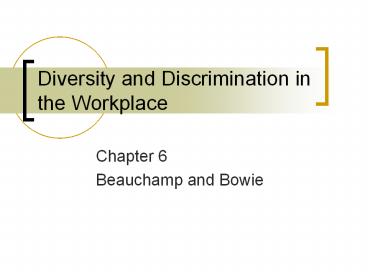Diversity and Discrimination in the Workplace - PowerPoint PPT Presentation
1 / 17
Title:
Diversity and Discrimination in the Workplace
Description:
Diversity and Discrimination in the Workplace Chapter 6 Beauchamp and Bowie Discrimination Definition Dictionary Wiki Equals are treated unequally OR unequals are ... – PowerPoint PPT presentation
Number of Views:1546
Avg rating:3.0/5.0
Title: Diversity and Discrimination in the Workplace
1
Diversity and Discrimination in the Workplace
- Chapter 6
- Beauchamp and Bowie
2
Discrimination
- Definition
- Dictionary
- Wiki
- Equals are treated unequally OR unequals are
treated equally
3
Legal Issues
- Title VII of the Civil Rights Act of 1964 forbids
employment discrimination upon the basis of race,
color, religion, sex and national origin. - There are other federal laws regarding
discrimination - http//www.eeoc.gov/facts/qanda.html
4
If it exists, should discrimination be
addressed?
- What would Rawls have to say?
- What about a Utilitarian?
- A Libertarian?
5
If discrimination should be addressed, the how?
- Outreach efforts weak affirmative action
- Preferential hiring Strong affirmative action
6
What does the federal government say?
- For federal contractors and subcontractors,
affirmative action must be taken by covered
employers to recruit and advance qualified
minorities, women, persons with disabilities, and
covered veterans. Affirmative actions include
training programs, outreach efforts, and other
positive steps. These procedures should be
incorporated into the companys written personnel
policies. Employers with written affirmative
action programs must implement them, keep them on
file and update them annually. DOL website
7
Arguments in favor of preferential hiring
- Compensatory justice
- if an injustice has been committed, just
compensation or reparation is owed to the injured
party - Need for diversity
- BSR
- Discrimination is costly
- Griffith University - Australia
8
Arguments against preferential hiring
- granting preferential treatment to groups does
not address the issue of discrimination against
individuals - preferential hiring is a form of reverse
discrimination and this violates principles of
justice - Nagel points out that there is not a negative
stigma associated with reverse discrimination as
there was (is) with discrimination - no negative
or hostile intent - affirmative action reduces the self esteem of
people who receive preferential treatment
9
Arguments against preferential hiring (contd)
- no criteria exists for measuring just
compensation - employment discrimination is currently not a
significant problem and can be controlled - those who have been harmed by past discrimination
are not longer alive and, as such, cannot be
compensated
10
Arguments against preferential hiring (contd)
- affirmative action is inefficient and may lead to
higher costs IF less qualified people get jobs or
other preferences - this probably depends upon the situation -
sometimes the positive impact of affirmative
action may be long term benefits, especially in
education - if diversity is so great, why are only certain
groups singled out for preference? (e.g., women
and minorities) Why not diversify according to
other criteria?
11
Other issues
- There are other forms of discrimination other
than those based on race, gender, age, etc., but
they are not illegal. - How should business address these forms of
discrimination?
12
Sexual Harassment
- What is it?
- EEOC
- Must be severe and pervasive
13
Whats so bad about sexual harassment?
- affects job performance
- thus it may affect promotions, raises, etc.
- can cause psychological and physical damage
14
What about freedom of speech?
- While the first amendment restricts the
government from creating laws "bridging the
freedom of speech," no court has ever held that
the right to free speech is absolute. Rather, the
law recognizes circumstances in which the
government may lawfully regulate expression,
including speech that is determined as a matter
of law to be obscene expression that is
libelous or slanderous so-called "fighting
words," which by their very utterance inflict
injury or tend to incite an immediate breach of
the peace.
15
What about freedom of speech? (contd)
- Moreover, the first amendment does not guarantee
unrestricted freedom of speech in the workplace.
An employer may impose reasonable time, place and
manner restrictions on expression in an
employment setting. - because of the nature of employment, a worker
cannot avoid the harassing speech - also, there may be "power hierarchy" involved -
there may be adverse consequences of complaining
or taking other action - women also tend to be at
lower level positions than men
16
BUT. . . .
- as Eugene Volokh argues, political speech may be
viewed as harassment (by the way, who is David
Duke and why might you find a David Duke for
President poster offensive???) - the terms "severe" and "pervasive" are too vague
17
What do the courts say?
- Meritor Savings Bank v. Vinson is a landmark case
with respect to sexual harassment































